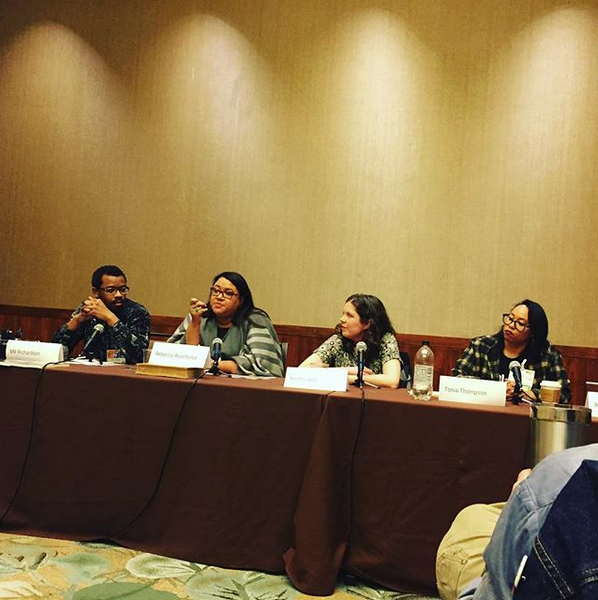Warning: Subjects in your blind spot may be bigger than they appear
I have recently returned from Boskone 56 with a head full of storylines, character sketches, and half-written blog posts, as well as a heart full of catching up with old friends and making new ones. This is not unusual. However, this year I also feel that I’ve come back with a greater understanding of why diverse voices are so important and how, no matter how clear I think my vision is, I will always have blind spots that can only be illuminated by someone with a different point of view.
The first panel I went to see was on doomsdays and apocalypses: what they are, how writers interact with them, if there’s one coming our way soon etc. Not only was I interested in the subject, but I was familiar with a few of the panelists and thought it would be an informative and fun panel. I arrived just as they started and settled in.
The panel was diverse. I thought Boskone did a great job with that this year. I gathered no empirical evidence, but I don’t recall any of the panels I either sat on or attended ever having more than two white men on them. The doomsday panelists introduced themselves and their work and then dove into the subject. I don’t recall the exact wording, but the moderator’s first question was basically inquiring how the panelists thought that doomsday would come. When the question reached Rebecca Roanhorse, an indigenous writer whose latest book, the Nebula award nominated Trail of Lightningis a post-apocalyptic tale set in a Navajo community, she pushed back on the question.
“For my people, doomsday has already come.”
I was shattered.
I’m a smart guy. And I consider myself pretty enlightened. And yet, this had not occurred to me. I knew the bald fact that the native population of this continent had been slaughtered and enslaved. But I hadn’t truly understood how deeply this ran. They had not just been devastated physically. Their cultural and mythological landscape had been devastated, as well. Tell me, Judeo-Christian readers, how differently would the Book of Revelations read if it had already happened?
I knew the facts of the native apocalypse, but not the truth of it. As a Jew, I would think that I have a special empathy for victims of genocidal forces. But despite this, though I knew of the horrors, I didn’t know the horror. I had missed the depth of the thing, for I had not lived with it the way Roanhorse and her people had, not known it for every moment of my life, not been forced to constantly and consistently view the world and my existence through that lens.
This is why diverse voices on panels of this kind—of any kind—are necessary. No old white man, no matter how qualified, no matter how erudite or educated, can provide this perspective. It comes from a bone deep, generational knowledge, a knowing beneath the brain.
I can’t speak for anyone else, but I want to know these things. I want my eyes and my soul opened to new viewpoints and perspectives. It enriches me as a writer and as a human being. But it is not enough to simply want. One has to seek this knowledge out, encourage its dissemination, and be intentional in rooting out the blind spots in one’s own worldview.
I spent the rest of Boskone with this in mind. I tried to be open to my own flaws and blind spots. Tried to engage on this subject with people from both marginalized and mainstream cultures. Tried to listen more than speak.
Those who know me well—or more likely, anyone who has ever met me—can guess how difficult that last piece was.
It’s likely that I failed more than I succeeded on the tasks I set myself, but as I always tell my kids, error is a very important part of the trial and error method. So, I will continue to engage and explore, stepping on the occasional toe, chewing the occasional shoe, and apologizing when necessary, all the while trying to clear my vision of the blind spots it has grown.
